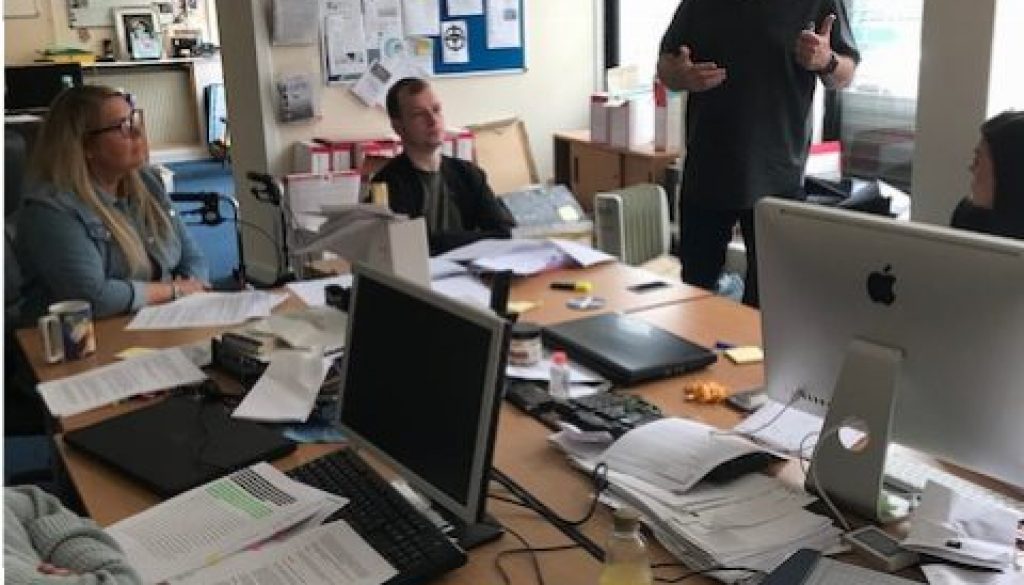Volunteering at MOJO
Continuing our series of articles by our volunteers, today we bring you the thoughts and observations of our senior caseworker, Katherine Galea. In her two years of dedicated service with us Katherine, a criminology graduate with attitude, has added huge value to our team with her thorough and painstaking, but insightful, approach to the work that we do. We are very lucky to have her.
The summer of 2018 was coming to an end when I toddled along Saltmarket to meet Cathy and Euan for a very informal interview to join the team. I had been introduced to MOJO by the inspirational Rachael, a volunteer caseworker, who I had met whilst studying criminology that year. During these studies I had learned to be as horrified as I was fascinated by the challenge of systemising ‘justice’. Even my basic beliefs about how to manage crime in society were dismantled by the shaking and multiplication of all the parts that formed those beliefs. Armed with improved humility and a deepened respect for the complex and problematic project that is ‘creating a just society’, I wanted to get involved in a project that confronts justice’s shortcomings, and advocates on behalf of its casualties.
MOJO indicates a crucial facet of the issue of justice: the potential for the system to grossly contradict its own objective by punishing the innocent. Despite an interest in, and often times admiration for, the legal system, I have never idolised the law or the way that it is enforced. When I joined the MOJO team, I learned I had room still for disillusionment.
Part of the battle for me has been to comprehend how comfortably the systemic failure of a wrongful conviction can manifest. The reality is not necessarily that wrongful convictions are pandemic, but more so that there is a significant systemic vulnerability to wrongful conviction. Very many of the applicants to MOJO are guilty of their convictions, but for the clients that we work with (because we believe they are innocent), the significance of this vulnerability cannot be overstated.
The consequence of imperfect justice is not abstract: wrongful incarceration is a very tangible horror. At MOJO I have had the privilege of meeting and getting to know some of the people who have been wrongfully convicted. They have faced these unimaginable realities hidden behind the court and prison walls, while people like me have lived free lives in ignorance. They have been condemned by a set of processes, by a system, that the wider world trusts. Worse still, the justice system derives its authority from the body politic: what is imposed upon victims of miscarriages of justice is done in our name.
The importance of MOJO, therefore, for me, is the expression of solidarity (both in a symbolic and a practical capacity) with those whom justice has eluded. MOJO bears witness to the fallibility of the justice system, and demonstrates that trust in the system must be conditional. It is a system that, being designed and run by humans, is susceptible to fault. Admission of this imperfection is the only way to invite progress.
To some, MOJO may appear to be a thorn in the side of the justice system – unattractive woodworms carving at a job done. I would argue that MOJO is a guardian of the system’s authenticity. Any system that values and upholds its principles should welcome dissection. Resistance to investigation, refusal to admit error, and the repulsion of criticism, are indicators of a narcissistic and corrupt authority.
In spite of their intentions, the courts sometimes rob innocent individuals of their time, potential, spirit and dignity. When this happens, there is no way to undo this profound suffering (although subsequent exoneration may, in some senses, reduce it). It is not hard, however, to understand the significance of allies in this experience. And it is not hard to understand the desire to be an ally.
I really love walking into MOJO’s offices to work for the clients that have been assigned to me. There’s no doubt that the casework is a very steep uphill battle riddled with frustrations – the details are grim, and the odds are always heavily against our clients. Getting involved with MOJO has meant that, when confronted by the nightmare of wrongful convictions, I am positioned to do something (even if limited) to support these individuals whom are owed support by a just society, and that is a position of privilege.
To me, coming from a non-legal background, the justice system loomed large as an imposing and confusing bureaucracy. With infinitely patient teaching and guidance I’ve begun to understand that it is, in fact, an imposing and confusing bureaucracy. This has been an unparalleled opportunity for me to become increasingly familiar with the intricacies of appeals law. I am free to ask questions in the office at a rate that might be classed as harassment. The team’s patience for teaching is a mark of their dedication to the clients.
Beyond the clients, however, is a broader investment in society by giving caseworkers, many of whom will enter the legal field, the tools to scrutinise the procedures of justice. I am excited by the prospect of an influx of graduates who are committed to being reflexive in the field of justice. Volunteers at MOJO are familiar with the potential for miscarriages of justice – we have no excuse for complacency in navigating the legal system or society more generally.
Working at MOJO has been nothing but rewarding. Of course, I wish that there was never any need for the organisation to exist in the first place, but at present the need is vital. It is an honour to work with such special and genuine colleagues, and to work for our enduring, worthy clients.

![16[2]](https://mojoscotland.org/wp-content/uploads/2024/06/162-1024x768-394x330.jpg)

